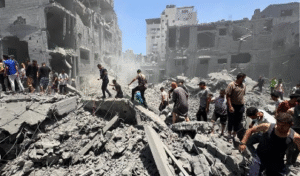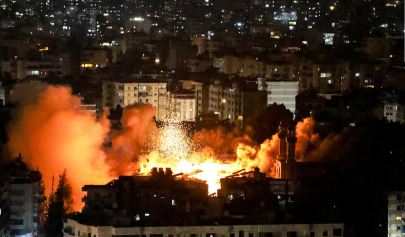Israeli Attacks. Once more, upsetting the international community is a dramatic Middle Eastern escalation involving direct Israeli military strikes on Iranian territory. Although decades of simmering conflict between Israel and Iran have defined their relationship, the direct nature of the attacks and the ensuing diplomatic fallout indicate a perilous new chapter. Globally, especially via the prism of the UNSC, the responses of world powers show not only wrath but also great concern about the consequences for Israeli Attacks on world peace and stability.
Preceding the Israeli strikes
Israeli Attacks The geopolitical circumstances preceding the Israeli strikes, the developing drama inside the UNSC, member states’ responses, legal and diplomatic ramifications, and the wider influence on the Middle East and world order are investigated in this paper.
Many member states’ expressed wrath is not only about Israel’s strikes on Iran but also about a developing sense of impotence in the face of international law transgressions and unbridled aggression. The road forward calls for quick diplomacy, fresh dedication to international standards, and—above all—a realization that military might cannot take front stage over human life and international law.
Historical background of Israeli-Iranian conflicts
One must follow the long-standing hostility between Israel and Iran to grasp the anger at the UNSC. Iran has positioned itself as a vocal critic of Israel’s existence since the Islamic Revolution in 1979. Israel regards as terrorist organizations Israeli AttacksTehran has given groups like Hezbollah and Hamas military and financial support. On the other hand, Israel has carried out many covert and overt actions to limit Iranian influence in the area, especially concerning Iran’s nuclear program.
Allegations of Iranian uranium enrichment for weaponizing, cyberattacks linked to Israel, and deliberate killings of Iranian nuclear scientists have driven tensions over the past two decades higher. The mistrust persisted notwithstanding the 2015 Joint Comprehensive Plan of Action
Israeli Strikes on Iran
Unprecedented Israeli strikes aimed at Iranian military installations deep inside Iranian territory acted as the immediate impetus for the UNSC’s emergency session. Reports verified strikes in suspected nuclear development sites in Tehran’s suburbs and Isfahan. Israel claimed pre-emptive self-defense
Still, the scope and boldness of the operation were unlike anything else. Previous events: There were recorded civilian casualties along with military personnel losses and infrastructure damage. Iran declared the strikes to be “an act of war,” pledging reprisal. Full-scale war between the two regional rivals sounded realistic for the first time in years.
Emergency UNSC Meeting: Tensions Run High
Iran formally asked for a UNSC emergency session following the strikes. Within hours, delegates from every one of the fifteen member states gathered in New York. There was frustration, urgency, and even pure wrath in the air.
Iran’s posture
Declaring Israel’s actions to be a flagrant breach of international law, sovereignty, and the UN Charter, Iran’s UN Ambassador offered a harsh criticism of Israel. He urged the Security Council to enact quick, punishing actions and charged Israel with state terrorism.
“The silence of this council has energized Israel for years,” he said. “Today’s attack is directly the outcome of years of unbridled aggressiveness and impunity.”
Iran’s demand for
A verdict denigrating Israel
Sanctions for economics
an overseas probe
Reimbursed civilian losses
Response from Israel
Defining Israel’s right to defend itself, the ambassador of Israel justified the strikes. He claimed intelligence showed Iran was about ready to launch a drone and missile attack on Israeli cities.
He said, “We do not seek war, but we will not sit idle while Iran arms itself for destruction. Our activities were deliberate, legal, and required. He also claimed council hypocrisy in response to Iranian concerns over the years and attacked the UNSC’s inaction.
Reactions of Principal Member States: United States
The United States danced diplomatically on a tightrope. Historically, Israel’s closest friend, the United States, voiced worries about the escalation but did not call
“We understand Israel’s security concerns, but further escalation will not bring security—it will bring catastrophe.”
Russia
Russia openly disapproved of Israel’s activities. Russia dubbed the strikes “reckless,” “illegal,” and “a threat to regional peace,” matching Iran. Russia insisted on the UNSC
The road forward calls for quick diplomacy, fresh dedication to international standards, and—above all—a realization that military might cannot take front stage over human life and international law.
United Kingdom
Taking more middle ground, the UK and France denounced the bloodshed and demanded de-escalation. Both voiced worries about Iran’s regional actions, though, and advised both sides not to fan a more general conflict.
Many member states’ expressed wrath is not only about Israel’s strikes on Iran but also about a developing sense of impotence in the face of international law transgressions and unbridled aggression. The road forward calls for quick diplomacy, fresh dedication to international standards, and—above all—a realization that military might cannot take front stage over human life and international law.
Temporary Members Non-Permanent
Rising violence alarmed several non-permanent members, including Brazil, Ghana, and the UAE. Many asked the council to fulfill its obligations and act forcefully to stop more deaths.
The worldwide response emphasizes the mounting ineffectiveness of global governance systems, particularly with regard to the reactions and paralysis of the United Nations Security Council. Considered the pillar of world peacekeeping, the council has failed to stop or sufficiently react to a possibly disastrous regional war.
Legal Argument
Aggressive or Defensive Behavior? Israel used Article 51 of the UN Charter, which permits self-defense should an armed attack take place. But several members contended that preemptive strikes—especially in the absence of clear proof—create a dangerous precedent.
ti me of firmly established alliances and geopolitical rivalries. The function of diplomacy, de-escalation, and multilateral cooperation has never been more important as tensions continue to be high. Without these initiatives, the world might be approaching a more general conflict that none of no country wants—but few are working hard enough to stop.
International legal academics disagreed:
From a pro-Israel standpoint, the action might be justified under anticipatory self-defense should Israel have reliable intelligence of an impending attack.
From a pro-Iran point of view, the attack amounted to aggression under international law and broke the sovereignty of a UN member state.
The lack of clear evidence presented to the UNSC added to complicate the discussion. Many members repeated their demands for an autonomous UN inquiry.
Civil Society and Worldwide Mass Action
strikes set off worldwide large-scale demonstrations. While social media was overflowing with hashtags like #StopTheWar, #UNActNow, and #NoMore Middle East Wars, demonstrators gathered outside Israeli embassies
Human rights groups issued urgent appeals for de-escalation; Amnesty International and Human Rights Watch demand
Local Fallout and Military Action
Following the strikes, the area went under increased alert right away:
Iran started shifting military hardware and turned on missile defense systems.
Israel strengthened its Iron Dome defense system and rallied reserve troops.
More ships of the United States Navy arrived in the Persian Gulf.
Saudi Arabia and the United Emirates called emergency Gulf Cooperation Council (GCC) meetings.
Dangerously close was the prospect of a more general regional conflict involving Hezbollah, Syrian militias, or even Gulf states.
Advocates Mediation and Ceasefire.
Demand for an instantaneous ceasefire came from many countries and organizations, including the Arab League, the African Union, and the EU. Declaring that the situation
Reportedly under progress were backchannel initiatives with Qatar, Oman, and Switzerland willing to arbitrate. Also advocating peace, Pope Francis urged moderation and communication.
UNSC Deadlock and Veto Political Theory
The UNSC stayed paralyzed in spite of many recommendations. The U.S. blocked draft resolutions denouncing Israel; Russia and China vetoed proposals
For non-permanent members and civil society organizations accusing the UNSC
The Brazilian ambassador said, “this body cannot be a forum for political games while the world burns.”
As of the most recent meetings, attempts to pass a neutral resolution demanding de-escalation, humanitarian access, Israeli Attacks</p>
Humanitarian Issues
The strikes and consequent tensions raised important humanitarian issues:
Iran claimed more than 150 civilian casualties, comprising women and children among other groups.
Important facilities including Isfahan’s hospitals and power systems suffered.
Fears about follow-up strikes drove thousands of people from their homes.
International non-governmental organisations demanded immediate humanitarian aid. The UN Office for the Coordination of Humanitarian Affairs (OCHA) issued a warning of an escalating crisis while the Red Cross turned on its emergency relief procedures.
Media Coverage and Information Warfare
Israeli Attacks</strong> The media coverage of the event was polarizing as expected:
Mostly, Western media reflected Israeli explanations.
Iranian official television called the strikes genocidal.
Restricted access meant independent reporters battled to confirm facts.
Online, the information war got more intense as both countries pushed narratives to change the world’s perception. Further muddy the waters are deepfakes, altered images, and artificial intelligence-generated “news.”
Greater Consequences for World Politics
Israeli Attacks. More general consequences of the Israeli-Iran conflict and the UNSC’s ineffective reaction are:
UNSC Credibility Crisis: The UNSC’s legitimacy has been undermined by consistent inaction in disputes involving strong countries.
Middle East Instability: Other regional players could be empowered enough to act unilaterally.
Rising Global Tensions: Western and Eastern powers’ geopolitical divide is clearly shown.
Iran’s nuclear aspirations could hasten post-strikes, thus Israel might engage in more covert activity to stop this.
The Israeli Strikes’ Immediate Aftermath
Israeli The first accounts of the strikes presented a depressing picture. Iran admitted to explosions close to important nuclear and military sites. Israel’s intentions were clear to most world observers, even though, in line with its long-standing ambiguity policy, it did not immediately confirm the attacks.
Iran promised reprisal, which raised military alert levels all around. Both countries’ civilian populations prepared for escalation while oil markets responded with extreme volatility. Humanitarian groups cautioned of possible mass migration should a full-scale conflict start.
UNSC Emergency Session
Hot Arguments and Diplomatic Anarchy. Originally scheduled behind closed doors, then for public remarks, the UNSC conference was anything from cohesive. Consensus was elusive for the council’s permanent members, the USA, UK, France, China, and Russia.
Russia and China sharply denounced the Israeli strikes, calling them “aggressive, illegal, and reckless,” and accused Western countries of double standards.
Many non-permanent members also complained. Nations including Brazil, Ghana, and the United Arab Emirates questioned the UNSC’s efficiency in stopping the conflict and its ongoing favoritism of some powers.
Diplomatic maneuvering
The Israeli strikes shocked people all around. Large-scale demonstrations started outside Western embassies in Iran, burning Israeli and American flags. demonstrators demanded retribution and denounced what they called “international silence.”
Israeli Attacks Diplomatic initiatives picked up speed in parallel. The European Union urged de-escalation and indicated preparedness to act as a referee. While Saudi Arabia, traditionally an enemy of Iran, gently advised calm, Turkey and Qatar volunteered to act as a neutral ground for negotiations.
The Legality Argument
Does Israel Justify Under International Law? The divisive issue of legality forms the core of the UNSC’s resentment and inaction. Many legal experts, meanwhile, and countries disagree. Pre-emptive self-defense is a grey area according to international law. Critics contend that the Israeli strikes constitute an illegal use of force in the absence of clear proof of an impending attack by Iran.
Moreover, the fact that the UNSC has not adopted a legally binding resolution shows the paralysis brought about by geopolitical alignments inside the council, especially with reference to the veto authority of the permanent members.
Humanitarian Effects and the Chance of Regional War

The humanitarian aftermath is among the most urgent issues brought up at the UNSC and by international non-governmental organizations. The risk to people remains great even if the Israeli strikes were aimed at specific targets. Tens of thousands of Iranians close to targeted areas, according to early estimates, have left their houses.
Healthcare: Fears of chemical or radiological exposure add to the strain Iran’s already taxed healthcare system bears.
Neighbouring nations like Iraq and Afghanistan could see an increase in refugee crossings, so taxing already limited resources.
Militias allied with Iran in Lebanon, Syria, Yemen, and Iraq are allegedly getting ready for reprisals against American and Israeli interests in the area.
The Middle East is more likely to be engulfed in yet another protracted conflict, the longer the world community dithers.
The conundrum facing the United States.
The United States is under great scrutiny as Israel’s closest friend and permanent UNSC member. Although Washington formally supports Israel’s security, the Biden administration is also concerned about a more general regional conflict, particularly with U.S. forces positioned around the Middle East.
This episode is a devastating critique of the limits of global diplomacy in the face of ingrained power politics, not only a wake-up call on Middle Eastern volatility. Should the UNSC fail to act forcefully in times like these, its relevance will progressively fade.
Russia and China:
Israeli Attacks Political advantage in anarchy. Seizing the chance to expose Western hypocrisy and establish themselves as defenders of international law, China and Russia have turned. Already isolated because of its actions in Ukraine, Moscow is highlighting what it believes to be Western double standards using the Israeli strikes.
China, on the other hand, has expanded its diplomatic contacts to Middle Eastern countries, advocating a new security architecture headed by regional powers instead of the West. Beijing has more leverage because of recent investments in Iranian energy and infrastructure.
Both countries have blocked resolutions favoring Israel and demand sanctions or condemnations using their UNSC positions.
Arab World: Division and Complustration
Arab responses have split rather sharply. Gulf countries like the UAE and Saudi Arabia have been more subdued, while countries like Syria and Iraq have harshly denounced the Israeli strikes. Their wary tone betrays a deeper strategic calculation: many of these states see Iran’s influence as destabilizing and are cautious about intervening.
Still, the Arab League has demanded a quick summit since internal pressure is mounting. Public opinion in the Arab world mostly supports Iran’s right to retaliate, so separating governments from their people.
Internal Politics of Israel:
Divided Nation Strikes inside Israel have been both hailed and attacked. While defense hawks and hardline nationalists praise the government’s forceful action, peace activists and moderate voices caution against a worrisome escalation.
Protests in Tel Aviv demanding negotiations rather than war have broken out. Families of soldiers worry that reprisal will lead to a protracted, bloody conflict. The Israeli government, meanwhile, insists that the activities were required and appropriate.
From Africa, Latin America, and Southeast Asia, nations demand a more democratic framework. They argue that the Israeli-Iranian conflict is only another instance of how geopolitical goals supersede morality and peace.
Final Thought
The Israeli strikes on Iran have set the world in chaos. Originally designed as the world’s peacekeeping agent, internal strife and geopolitical self-interest have once more made the UNSC useless. In diplomatic as well as civilian spheres, anger, frustration, and fear rule. The world watches as the area teeters on the brink of a more general war, powerless to intervene, but profoundly impacted.
This episode is a devastating critique of the limits of global diplomacy in the face of ingrained power politics, not only a wake-up call on Middle Eastern volatility. Should the UNSC fail to act forcefully in times like these, its relevance will progressively fade.
In conclusion
The state of affairs and resentment inside the UNSC following the Israeli strikes on Iran highlight a fundamental collapse in world governance. The council’s inability to act quickly and unanimously points to more fundamental structural defects compromising its peacekeeping capacity.
From legal and ethical conundrums to humanitarian crises and regional destabilization, the scenario calls for a quick and coordinated worldwide response. Real answers cannot be replaced by diplomatic posture or veto politics.
Whether the world learns from this moment or repeats the same deadly mistakes will probably determine the fate of the UNSC as well as global peace Israeli Attacks</p>
FQS
Q1: Why did Israel attack Iran?
Israel says the strikes aimed at military and nuclear sites directly endanger its security. Still, the validity of this justification is under examination internationally.
Q2: What has the UNSC responded with?
Divisions among permanent members prevented the UNSC from attaining a consensus on a resolution even as it called an emergency session Israeli Attacks</p>
Q3: How have people all around responded?
Reactions have been anything from support to criticism. Worldwide demonstrations sprang out, and many governments urged de-escalation.
Q4: Might a regional war break out?
Definitely yes. With possible escalation involving proxy forces and neighboring states, the situation has raised tensions all around the Middle East.
Q5: Could the UNSC be rebuilt to stop this kind of paralysis?
Reform is much sought for, but present permanent members who gain from the current system oppose meaningful change with great forcehttps://worldinfoes.com/wp-admin/post-new.php



